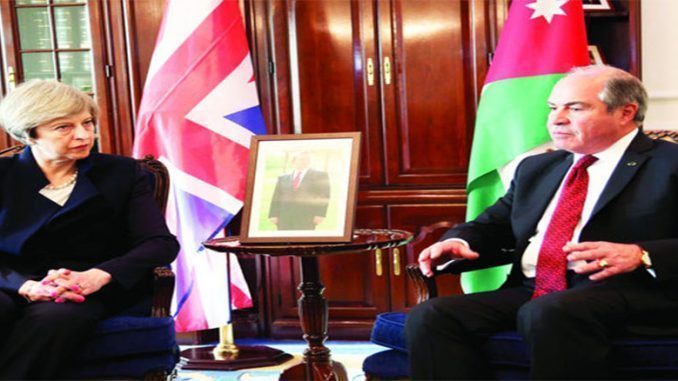
British Prime Minister Theresa May met Jordan’s King Abdallah at the start of a three-day trip to the kingdom and Saudi Arabia focused on security and post-Brexit trade efforts.
In Jordan, May was expected to announce that British military trainers will be sent to help the country’s air force fight ISIS.
She will visit Saudi Arabia on Tuesday and Wednesday for talks focused on trade and investment as Britain begins the process of leaving the EU.
Jordan’s official news agency Petra reported that May met the king shortly after arrival to discuss “military cooperation between both countries,” “the Syrian crisis and peace process,” and “counterterrorism efforts.”
They visited the headquarters of Jordan’s Rapid Response Forces, where May was told about the counterterrorism unit’s missions and training programs as part of the cooperation between both countries, it said.
May said before leaving Britain that it was “clearly in the UK’s security and prosperity interests to support Jordan and Saudi Arabia.”
May was planning to set out a package of measures to boost cooperation between British forces and the Royal Jordanian Air Force (RJAF), which along with Britain is part of the US-led coalition bombing ISIS in Iraq and Syria.
It will include training carried out in Jordan and Britain to help the RJAF “improve its capability” to carry out airstrikes against ISIS, she said.
“To tackle the threats we face from terrorism and from geopolitical instability, we must meet them at their source,” May said, describing Jordan as “on the frontline of multiple regional crises.”
In the wake of last month’s deadly attack on the British Parliament, she said that by working with countries such as Jordan “we are helping to keep British people safe.”
May said she would also discuss ways to help Jordan host a massive influx of refugees from the war in Syria.
In Riyadh, May will focus on trade, saying ahead of her trip that there is “immense potential for Saudi investment to provide a boost to the British economy.”
Britain is looking to strike new trade deals after May last week formally activated Article 50 of the Lisbon Treaty, starting a two-year countdown for quitting the EU.
Qatar announced plans last month to invest £5 billion ($6.23 billion) in Britain within five years.
Saudi Arabia is also looking at boosting its foreign investments as part of a long-term plan to diversify its economy and reduce its dependence on oil revenues.
May attended a Gulf summit in December in Bahrain, where she became the first woman and first British leader to address a summit of the Gulf Cooperation Council (GCC).
At the time, she said Britain would help “push back” against Iran and said she hoped to eventually agree an ambitious trade agreement with GCC countries.



